As a nostalgia watch, this review of Circle is going to be a bit looser than the other pieces in this science fiction deep dive. This is because I have an emotional attachment to Circle. It’s not just that I fell in love with the show (although I did). It’s that it sent me looking for places to discuss Korean dramas and to interact with other viewers. While I had read recaps and reviews from various places before then, Circle led me to set up shop at Dramabeans. And while my love for I’m Not a Robot was what made me an active member of that community, it was Circle that started everything. In a way, Circle is why I’m even here.
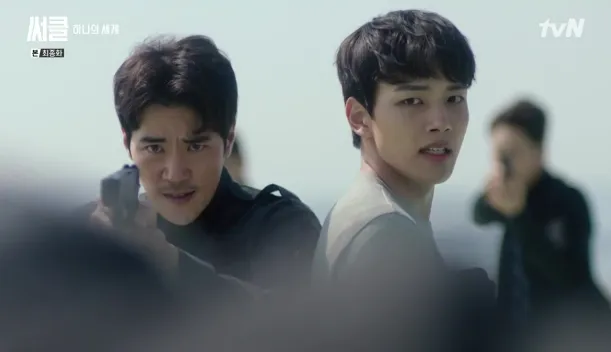
If you’d told me five or so years ago that I’d devote a significant chunk of my life not just to talking about Korean dramas but to writing a blog that’s at least 75% on that topic, I would not have believed you. Circle was when my life took a detour.
I watched Circle soon after it aired in 2017. I had downloaded it along with several other dramas to watch on The Island. The Island still has poor internet connectivity and so relying on wifi is not recommended. I still have those downloads, which is how I was able to rewatch. Unfortunately, as I note at the end of this piece, Circle is not available for streaming anywhere I could find in 2023. Hopefully that will change.
My holiday on the Island was somewhat of a farewell to a messy, difficult year in which I’d had major surgery, helped my father through prostate cancer, and continued to try to care for my severely disabled mother. Admittedly 2017 hadn’t met the pandemic yet. But at the time I thought that the worst of it might be over. And I definitely needed a break.
I read, I wrote, I drank gin, I walked on the beach and swam in the tropical waters and I watched dramas. Lots of dramas.
And one morning about 10am or so, I poured myself a coffee and pressed play on Circle.
As the drama unfolded over that day, I became completely gripped. I kept pressing play – on the next episode, the next and then the next. Afternoon became evening, evening became night and it was 2am when I finally finished.
I was hooked.
At that time, my knowledge of Kdramas was sophomoric so I wasn’t aware of how rare a beast a science fiction drama from Korea was. I also hadn’t read too much about the drama itself, just excited it was science fiction at all. So I knew what genre it was and that it starred Yeo Jin-goo but hadn’t bothered to look up what the drama was about and so I went in entirely cold. This led to a rather unusual aspect of my Circle experience; drama watching in a vacuum.
I thought Circle was fascinating. But I also thought that Circle was about something else.
Time travel.
If I had read anything about the drama beforehand, I would have known that it was billed as an alien drama and that ‘aliens visiting Earth’ was the show’s premise. But not knowing that, the question of whether the female lead, Han Jung-yeon/ Byul/ Bluebird was an alien was a question for me as a viewer as much as it was for the characters. A question that I felt was answered in the negative.
And despite an ambiguous ending that hits at an alien arrival, the events of Circle simply make more sense if she is not an alien but instead a time traveller.
So this nostalgia watch of Circle will be unique in that it’s the first and probably only time I write a review based on the contention that the writers are wrong about their own show (I’m aware of the hubris here but hope to be forgiven).
Circle is not about aliens at all. It’s about time travel.
Time travel and clones. There are definitely clones.
The plot
Circle is a mind-bending, time-warping tale with the first half of each episode set in 2017 and the second half 20 years in the future. Some episodes also start with a snippet from 2007 where our narrative ostensibly starts.
It’s 2017 and fraternal twins, Kim Woo-jin (Yeo Jin-goo) and Kim Bum-gyun (An Woo-yeon) embark on an investigation into the mystery of of Han Jung-yeon (Gong Seung-yeon), whom Bum-gyun is convinced is an alien. Twenty years later in 2037, future cop Kim Joon-hyuk (Kim Kang-woo) is on his own investigation into the mystery of what happened to those twins. This leads him to Smart Earth: a clean, peaceful and crime-free city off the coast of a polluted, crime-ridden future Seoul run by a shadowy organisation called Human B.
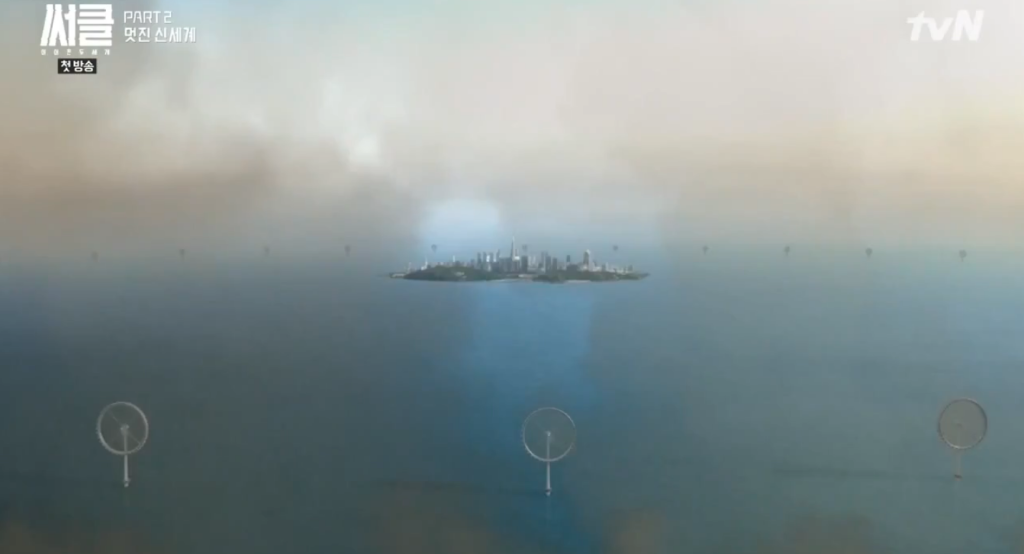
Events unfold simultaneously in both timelines, with 2017 and 2037 being inextricably intertwined. This means that when something happens in 2017 we get to see the impact of that action in the future it creates. It also allows the writers (of which there are a record-breaking four credited) to knowingly misdirect us by teasing us with something in the past timeline and then showing us a future that seems to support it.
A major theme of the drama is individual memory and by extension societal history. Seeing how the past creates the future within each episode helps to reinforce this theme. The past creates the present and the present creates the future. If you don’t remember the past, you can’t understand your own life now. And this applies to society as well as individuals.
The future envisaged by Circle includes memory-altering technology and the show’s constant questioning of how our memories shape who we are is endlessly insightful and often poignant. Unlike the other Korean scifi show I recently reviewed – Grid – Circle very nearly answers all our questions. However, it also has a notorious tease of a ending that hints at a second season: one that never arrived.
The aliens are here! (Or are they?)
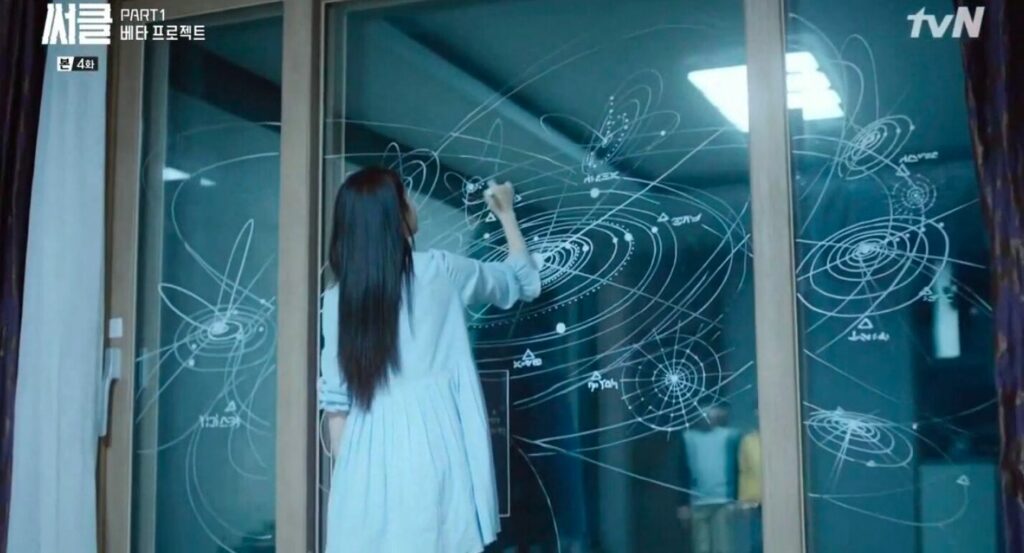
The characters and setup
NOTE: From this point on, there will be significant spoilers
Part 1: Beta Project
Circle begins in 2007 when an 11-year-old Kim Bum-gyun (Kim Ye-jun) goes into the mountains after his reckless ‘younger’* twin Kim Woo-jin (Jung Ji-hoon) who’s convinced that aliens have been secretly landing there.
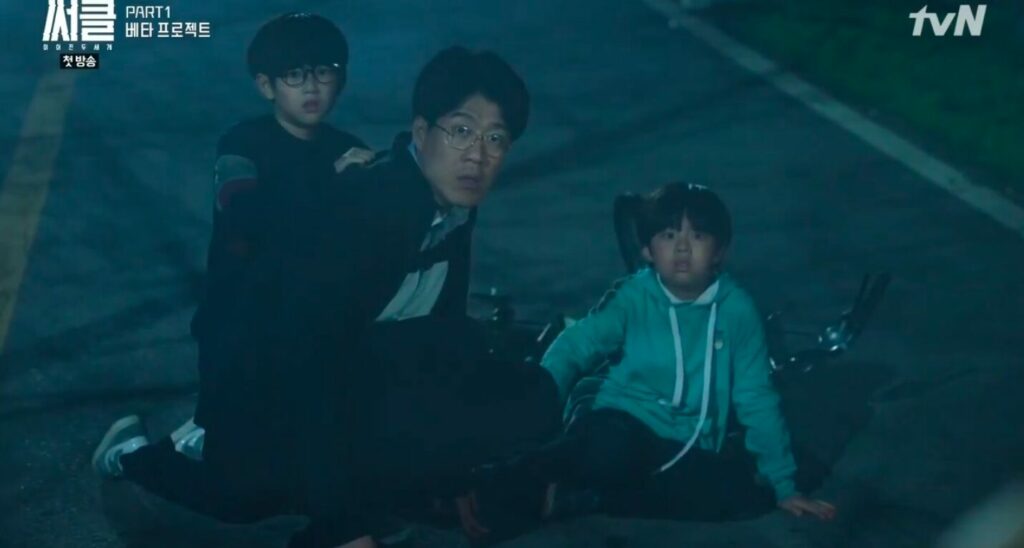
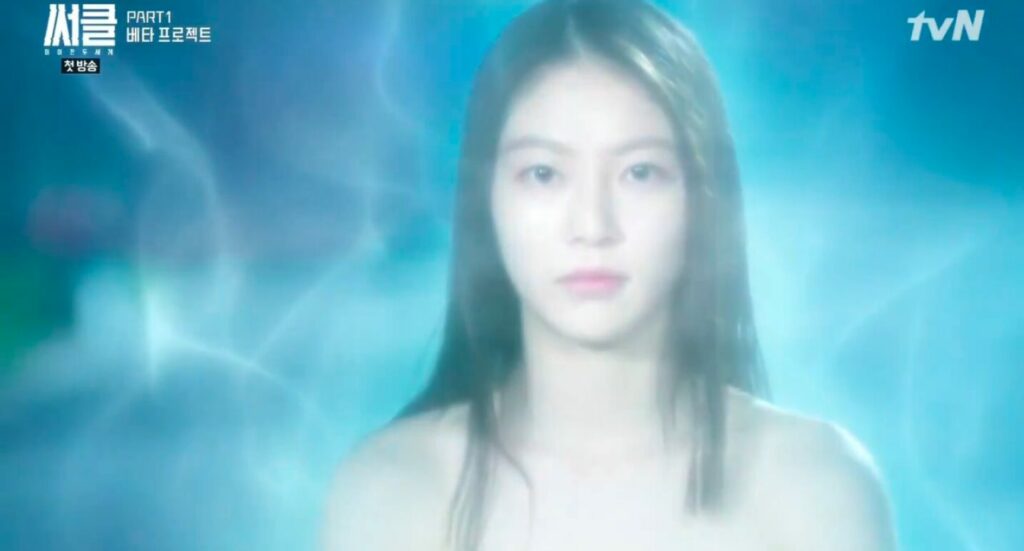
Their father Dr. Kim Kyu-chul (Kim Joong-ki) comes to find the two boys and so witnesses the arrival of a strange woman they call Byul (meaning star). She arrives in a ball of bright light and is initially mute. Kim Kyu-chul is a neuroscientist specialising in treating trauma and so he begins studying Byul in a secret lab that the boys play in growing up.
He and Byul leave one day and never come back: a scientist disappearing with the alien he’s been studying (from Bum-gyun’s perspective) or a man who ran off with a young woman he was having an affair with (from Woo-jin’s).
While Bum-gyun is now convinced of the existence of aliens and conspiracies and even that their father was abducted, Woo-jin was especially close to his ‘Noona’ and so especially disenchanted when she and his father apparently ran off together. He embraces scientific scepticism and a kind of aggressive and protective self-interest. It’s him against the world and he’s not going to let anybody mess with him.
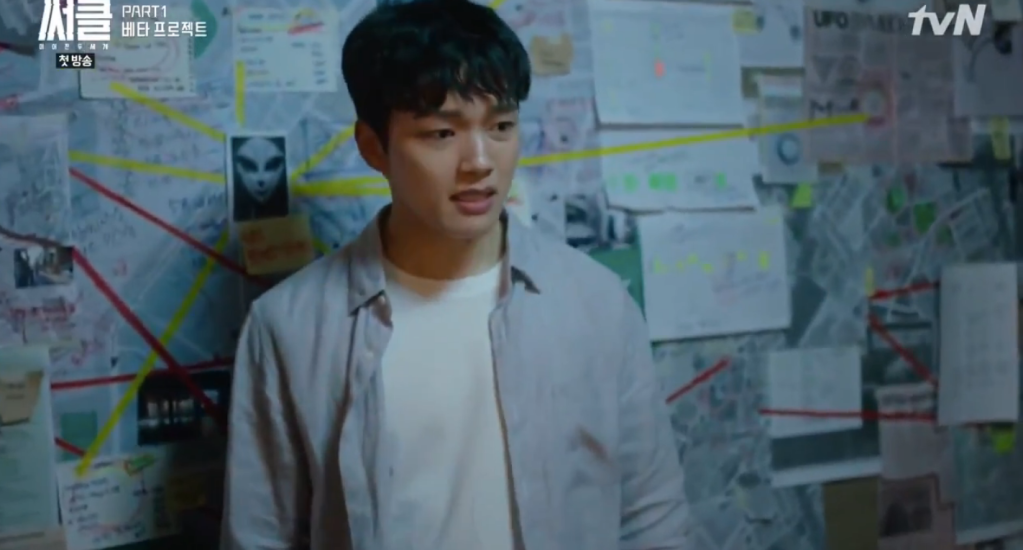
Whether Byul is a dangerous alien with advanced technology in her head or a lost traumatised girl taken advantage of by the man who took her into his home is ambiguous.
At least until the twins see Byul again.
She’s now 21-year-old University student, Han Jung-yeon with no memory of ever being Byul.
There’s a lovely parallel in the first episode where we see the two twins swapping their roles from sceptic to dedicated believer. Which reinforces the notion that despite looking different, they’re actually very similar.
In 2007, it was Woo-jin in the forest at night yelling about burnt pine cones and fog and he who points to the newly-arrived Byul and says, “See! I told you so! It’s an alien!”. Fast forward ten years, it’s Byum-gum who’s seemingly lost hold of his sanity as he runs around screaming about aliens while Woo-jin desperately tries to keep it together for his deranged older brother. And now it’s Byum-gum who points to Han Jung-yeon and says, “See! I told you so! It’s an alien!”
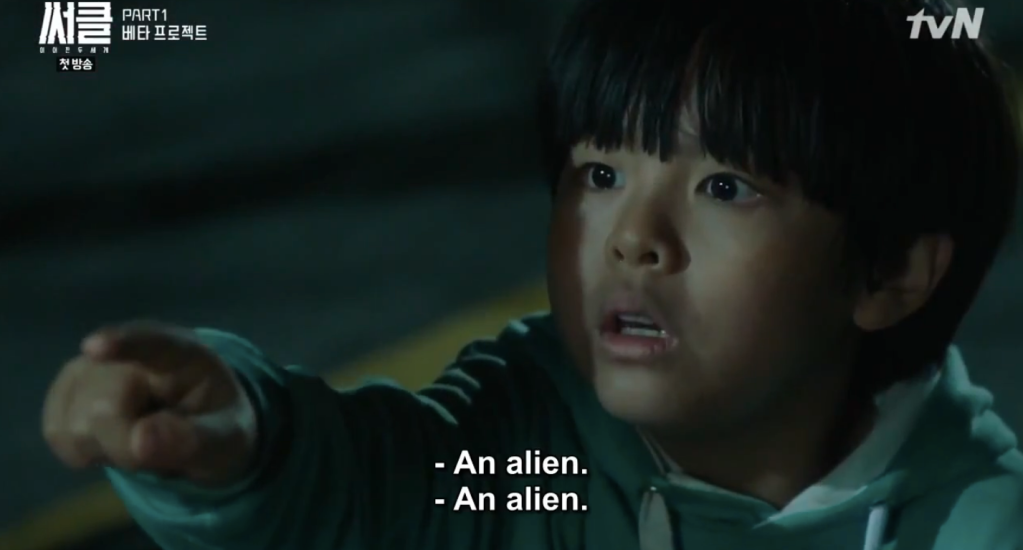
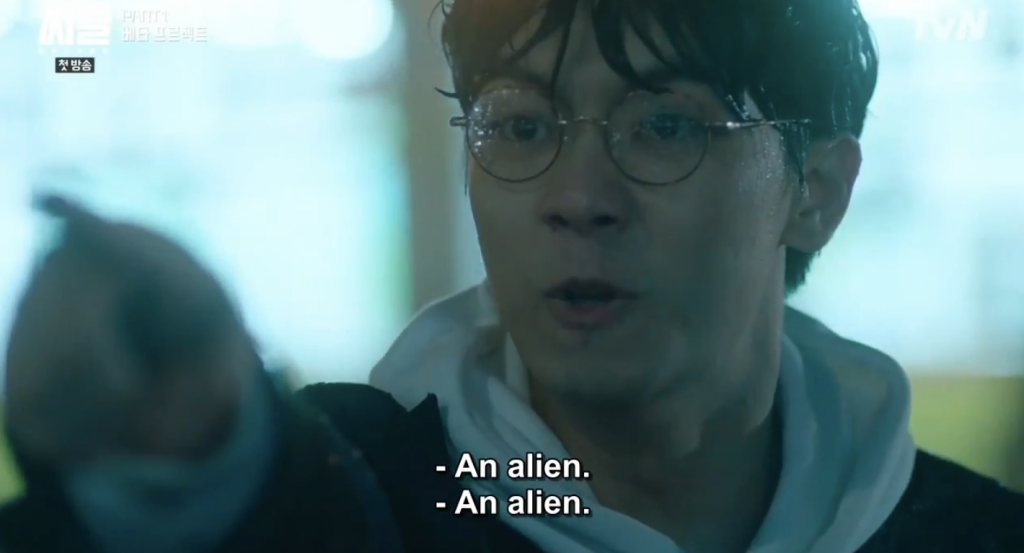
Is Han Jung-yeon a lying, unchanging alien who is hiding what she and the other aliens did to the twins’ father or just a girl with a strange resemblance to the one they knew when they were children? Or – as Woo-jin starts to suspect – a Byul who’s had her memories wiped and is being lied to by her ‘father’: the neuroscientist Han Yong-woo (Song Young-gyu) who used to work with their father and is now Woo-jin’s Professor at Handam University.
Han Yong-woo is continuing Kim Kyu-chul’s work on treating trauma through manipulating memory. They contend that a treatment for post-traumatic stress disorder (PTSD) is to remove the problematic memory completely.
While all this happening, students at the University are starting to die in ways that look like suicide. Bum-gyun is convinced it’s aliens but detective Hong Jin-hong (Seo Hyun-chul) is suspicious. His determination to investigate the deaths as murders eventually gets him suspended.
Part 2: Brave New World
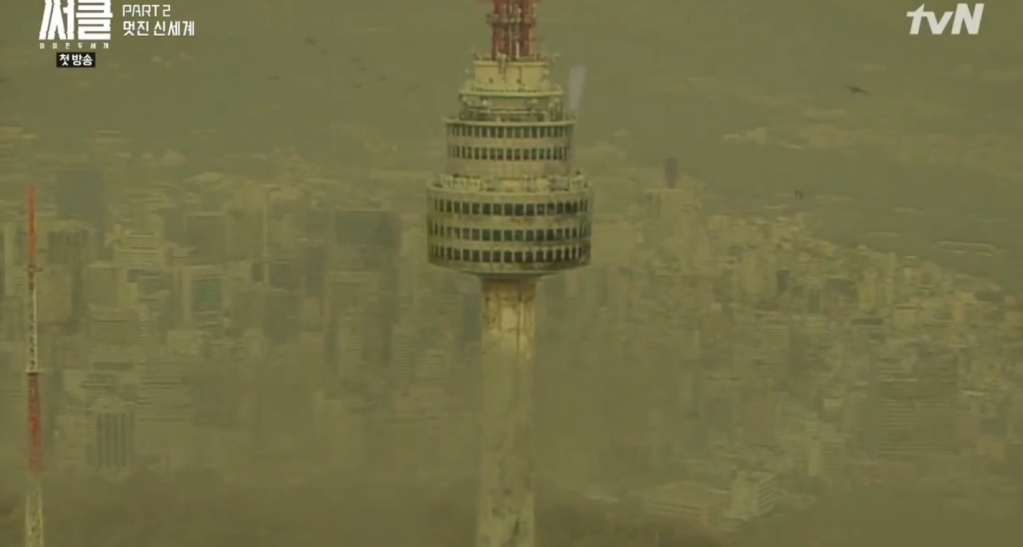
Meanwhile, in a desolate, filthy 2037, we meet cowboy cop, Kim Joon-hyuk. He’s working with the now-reinstated Hong Jin-hong as part of the Normal Earth police force. He enlists hacker, Lee Dong-soo (Oh Eui-shik) to hack into Smart Earth but Dong-soo says the only hacker who’s capable of that is one called Bluebird.
When there is a murder on Smart Earth, the Mayor panics at the apparent failure of the city’s patented chip technology, Stable Care. Stable Care is designed to ensure social harmony by regulating emotion. It kicks in to override excessive emotional responses with the benignly paternalistic Human B overseeing the technology and surveilling the population.
The Mayor agrees to let Joon-hyuk into Smart Earth unchipped to solve the crime as quickly and quietly as possible. It is the opportunity both he and Detective Hong have been waiting for, as Detective Hong is convinced that the missing twins have something to do with Human B.
As he investigates on Smart Earth, Joon-hyuk becomes increasingly concerned about when and how the denizens of that city are being subjected to memory alteration. He also has run-ins with the mysterious Bluebird who is after the same answers he is.
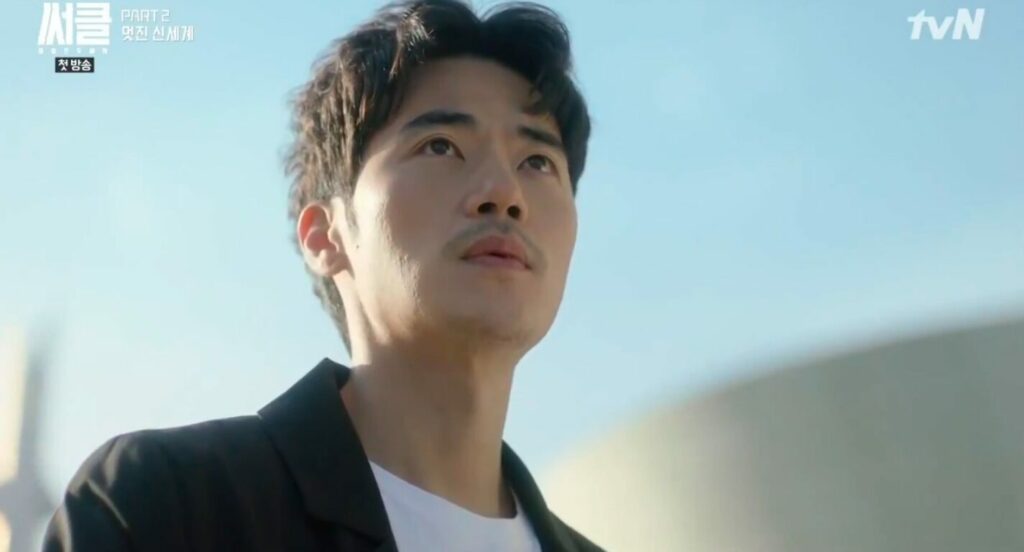
*In Korean, it’s normal for even twins to classify themselves by age with the first born being called hyung (older brother) or unni (older sister) by their younger (dongsaeng) sibling. This complexity around kinship terms is why the writers used a much less specific word for ‘sibling’ at the end of the first episode, resulting in Circle’s infamous translation error that led English-speaking viewers to think that Kim Joon-hyuk was the younger brother of the twins or possibly the third in what were actually triplets. Instead, the kinship term used is designed to let us know that he’s one of the twins without letting slip which one. Which twin he is and which twin went missing back in 2017 is part of the show’s mystery.
The production itself
At a tight 12 episodes, the show wastes little time on filler and instead launches itself into action from frame one. With each one hour episode broken into two, we only get half an hour in 2017 before racing to 2037. It’s a frenetic, tightly-edited pace that makes Circle a rollicking ride from its first frame. And if binge watched (like I did), it will sweep you through by keeping you on the edge of your seat.
On rewatch, the drama is just as interesting and just as gripping from the first scene and paces its revelations well. We see Woo-jin extol the virtues of removing traumatic memories right before a fast forward shows us a society where people’s traumatic memories have been removed. At the same time, we discover that Joon-hyuk has himself been subject to the technology and that the mysterious Chairman of Human B is aware of his true identity as one of the twins.
The drama builds up its suspense well as it juggles a great deal of balls and we start to wonder when and in what order they will fall.
The acting is also first rate, with Yeo Jin-goo and Ahn Woo-yeon in particular putting in astonishingly good performances as the fractured twins trying to make sense of their lives and bring some order to their disrupted universe. Yeo Jin-goo is always excellent and portrays perfectly a man who has lost everything and covers his loneliness and fear with a cold determination: a façade that cracks when it comes to his only remaining relative.
But Ahn Woo-yeon’s Bum-gyun is the revelation here: entirely believable as either a Cassandra character driven mad by societal disbelief or as a schizophrenic in desperate need of treatment.
The other standout performance is from idol actor, Lee Gi-kwang, who plays Smart Earth employee, Lee Ho-soo. An enthusiastic proponent of Smart Care and its emotion regulation, he at first refuses to believe that Human B is also messing with people’s memories – at least until his own begin to resurface. Gi-kwang gives a raw performance of a man who wants to feel as if he’s in control, even if that feeling is an illusion. He’d rather live a lie than remember a painful truth.
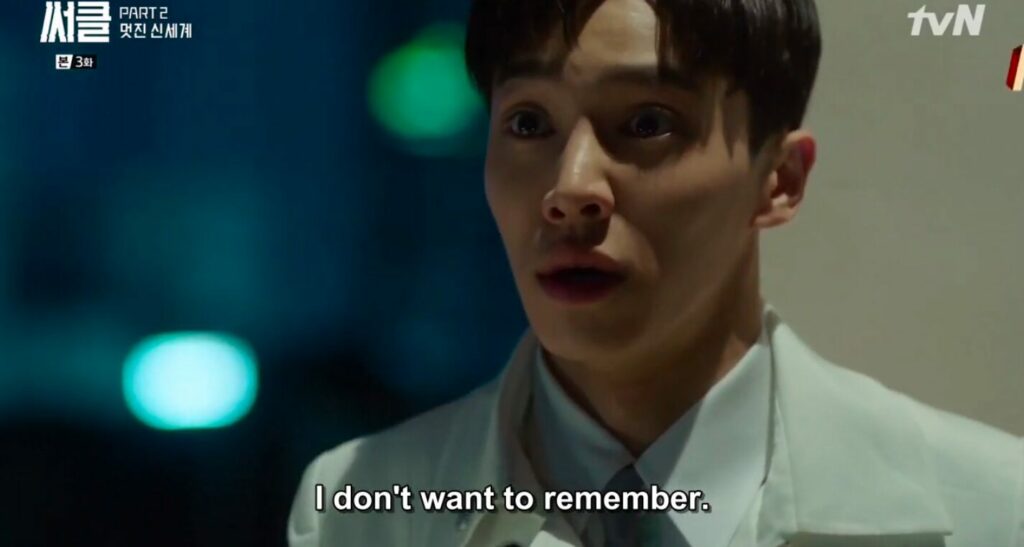
That lure of blissful ignorance is a siren call for many of our characters and the drama asks a serious question about whether we might be happier if we could just forget all the bad stuff. Certainly the citizens of Smart Earth seem happy, even if that happiness is contingent on a kind of systemic ignorance.
Because Circle is produced in two distinct parts, both those parts have distinct production elements. 2017’s is clearly easier since its setting was contemporaneous and the locations were around universities, libraries and warehouses. Bringing 2037 to life, however, took a bit more finesse and on an obviously tight budget it wasn’t always a success.
While the interior shots adequately conveyed an almost-sterile, technologically-advanced society, the exterior shots were too obviously that of Seoul. In both watches, I was sometimes confused as to whether Joon-hyuk was still on Smart Earth or had popped back to Normal Earth – and vice versa.
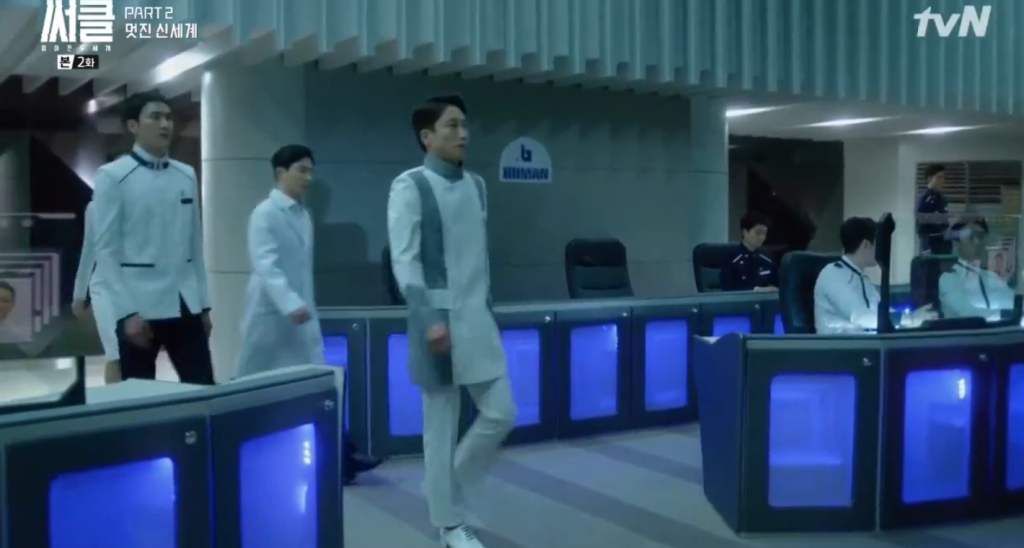
Regardless of budget, Circle needed to spend more time on making exteriors look like either the horribly polluted Normal Earth or the idyllic Smart Earth (rather than one unintentionally funny scene in episode 1 where they’d clearly thrown dirt on a car’s front window to imply it was driving through dense pollution).
In one scene in episode 3, Lee Ho-soo is drawn to a local cafe by his lost traumatic memories. But the cafe is so pristine and the air so clear that I thought he had returned to Smart Earth and was confused when he suddenly reappeared to thwart Joon-hyuk’s search for Bluebird on Normal Earth soon after.
As someone with a lot of experience with low-budget scifi (I am a classic Doctor Who fan after all), these are small gripes. In 2017 they didn’t have players like Netflix and Disney on the scene pouring production money into Korean speculative fiction. But, even for the era, Circle is made on a shoestring. Those budget cracks are showing in 2037.
The drama’s themes
Thematically, Circle is as strong as I remember with its emphasis on the way in which memory shapes us and is vital to making us… well us.
There are several powerful scenes around memory and what’s taken from us when we lose it. But the show also grapples with the attraction of forgetting, with wanting to jettison painful memories we can’t stop reliving.
In episode 2, Woo-jin first voices the idea that bad memories are like cancer cells. The only way to deal with the cancer of PTSD is to cut it out by excising those memories. The attractiveness of this concept is then embodied in Ho-soo who would prefer to live his life without having to relive his girlfriend’s suicide.
A powerful counterpoint to this argument is Joon-hyuk himself, who had all his memories wiped and functions solely off the back of recordings and videos of his life. He doesn’t know who he is on a deeply fundamental level. Circle spends a long time on the mystery of whether Joon-hyuk is Kim Bum-gyun or Kim Woo-jin because that is the question that Joon-hyuk is also grappling with and one that has no real answer.
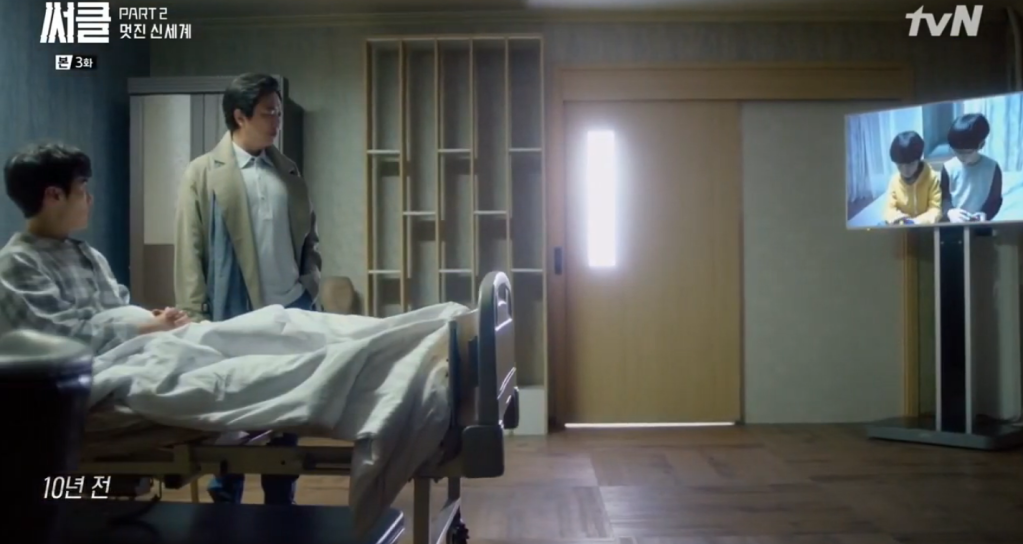
If his memories of being Bum-gyun have been erased and all he has is Woo-jin’s memory recordings to go on, then he may know what Bum-gyun knows but those memories are acquired as though from a third party observer. He is Bum-gyun but he has equal knowledge of the memories of Woo-jin. In the end, he could be both but he is neither.
He is Joon-hyuk with no idea of who Joon-hyuk is. It’s a source of true existential terror for him.
“Who are you?” then becomes the show’s underpinning question. One that’s asked constantly of characters like Joon-hyuk and Han Jung-yeon (Byul/Bluebird); questions they’re desperate to answer because their pasts have been deliberately erased.
At one point in episode 7, Woo-jin and Jung-yeon race to find evidence from Woo-jin’s grandmother who’s in a care home. When they get there, she has dementia, her past almost entirely scoured from her mind. She is the natural extension of excising your memories.
You think it might be good to lose your memories, the show is saying. Well that already happens and this is what it looks like.
And yet, as the murders in Smart Earth continue, we see a third pillar to the argument around memory. Without it, there is no true justice. If society deals with violence by trying to pretend it didn’t happen, then justice is impossible. Victims are handed back to their abusers, violence springs up unexpectedly, and perpetrators live happy, comfortable lives. It is as though everyone in some form has dementia. Societal dementia. Everything important is gone.
There are some who believe that society is happier if it’s built on an ignorance of history and a whitewashing of crimes. But that is a facade of happiness that is merely skin deep. A society built on collective amnesia is not a society without violence and crime. It is simply a society rotting from the pretense.
Memories make us take responsibility and memories serve justice.
Lee Ho-soo
People should take responsibility for their actions. Erasing our memories doesn’t mean (those actions) never happened.
Power is therefore not about who has money or the law behind them. Power becomes about who has memory. Or rather who can control what others remember.
Yes, if we have forgotten the crimes of history we are doomed to repeat them. But, more importantly, the person who knows more than you can manipulate and control you. Like Han Yong-woo controlled Jung-yeon by convincing her he was her father.
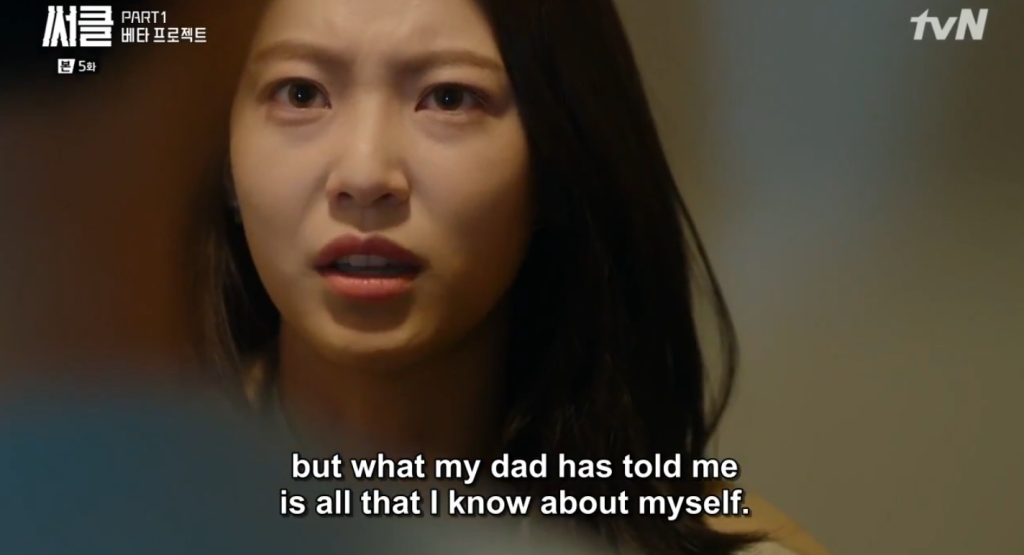
As Circle progresses, we discover that the technology used by Human B to create the Care Chip came from Byul. This is originally framed as a passive act whereby the technology was harvested from her. Later we find out that she created the technology for Woo-jin. This means that Jung-yeon spends the entire drama trying to find information about her own creation,unaware of what it is or how it works. By losing her memory of it, she loses control of it. Byul wanted to make sure humanity couldn’t misuse the technology. Instead her decision to wipe her memories meant that Human B could quietly use the technology any way it wanted without her knowing.
Of course, the relationship between memory and identity becomes embodied when Joon-hyuk finally discovers what happened to Woo-jin. He rescues Woo-jin only to find out that he’s a clone with Woo-jin’s memories implanted.
Despite being a clone, Woo-jin remembers being Woo-jin and he therefore is Woo-jin. Despite not being born Woo-jin, he is Woo-jin in a fundamental way in which Joon-hyuk is not Bum-gyun despite being born Bum-gyun. The same way in which Jung-yeon both is and is not Byul because she has no memory of that time.
Who we are – both individually and culturally – is only what we remember being.
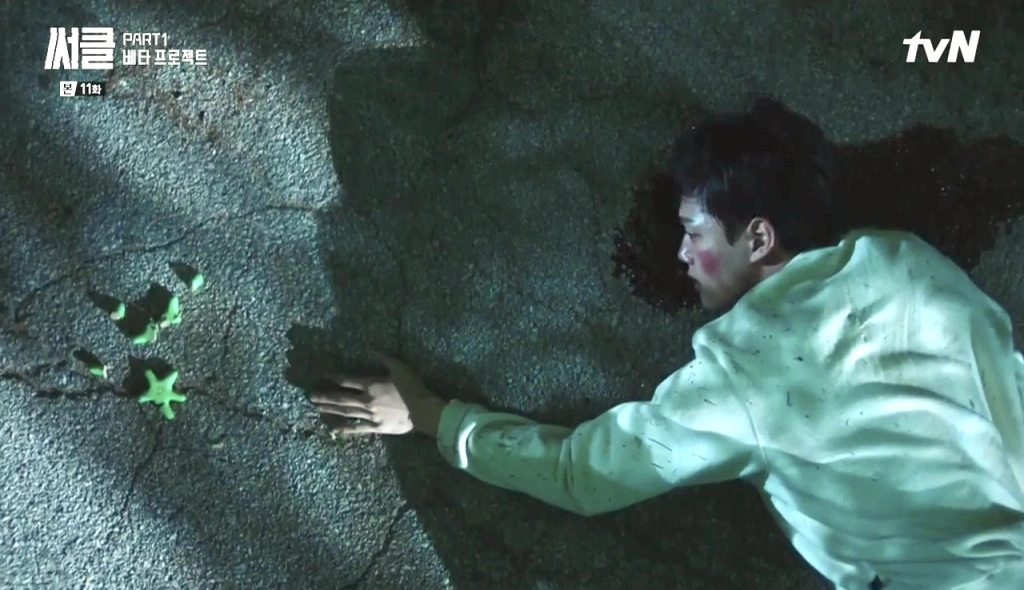
The Faustian bargain of Smarth Earth
The idea of the elite abandoning the rest of humanity to set up an enclave of privilege is not a new one. It’s been explored in films such as Elysium and high-quality television shows such as Brazil’s excellent 3%. Elysium’s floating city represented structural disadvantage between nations, while in the 3% it represented the capitalist promise that with hard work you can join the elite. Both cities entrenched the disadvantage and poverty it pretended to offer a way out of and both only existed because of the exploitation of those left behind .
In 2037 in Circle, we see Smart Earth not so much perpetuating structural disadvantage and environmental collapse as providing a place where the wealthy can hide from it. While the denizens of Smart Earth might at first seem to be the privileged few who have bought their way out of a crumbling Korea, they have instead made a Faustian bargain with Human B: their own material and psychological comfort in exchange for their complacent compliance. They haven’t found an Eden offshore, they have paid for a comfortable prison where Human B’s chairman controls them so completely he even controls their minds. They even paid handsome sums for the privilege.
What did I do wrong? Justice and responsibility? Why is that important? They said they wanted to be happy. They said all they wanted was happiness. That’s what I gave them. I gave them what they asked for.
Park Dong-geon
Kim Kyu-chul imagined a humanity freed from the disabling impact of crippling trauma. Han Yong-woo imagined a society carefully controlled for the greater good. Park Dong-geon simply imagined a world where he was in control. The progression from one to the other shows the way in which an otherwise neutral technology can eventually become more and more corrupted until it is used to embed power gained by a select few. Byul, after all, created the memory cube not to remove memories but to preserve them. She created it so that a young, grieving Woo-jin could record and replay memories of his mother.
The denizens of Smart Earth need to be released more than defeated. They’re an elite using ignorance to hide from the reality of their lives and the world around them. As far as analogies go, Smart Earth is closer to a gated community with a shared whitewashed history [It’s Florida! – last minute edit]. Whether they continue to live on the island therefore becomes less important than being forced to face the truth of their lives and the world around them.
True peace is not merely the absence of tension; it is the presence of justice.
Reverend Dr. Martin Luther King, Jr.
From Edison to Elon: Circle’s surprising insight into technological theft
These days, Thomas Edison is not so much famous for inventing the lightbulb. He’s more famous for using his wealth to employ scientists so he could claim credit for their work. History is in fact full of men with wealth buying the brains of less wealthy geniuses and then letting history name them as their inventor. In the American and European context, there is also a race and sex component here where the people from whose minds these inventions came were often women, or people of colour (or both). The white man got the credit. And wrote the history accordingly.
The most recent, of course, is Elon Musk, who specialises in buying companies and then rewriting history so their inventions or advances are named as his own. Since Musk’s vanities and tantrums make news more often these days, it led me to see something in Circle that I had missed the first time around.
From the beginning, every man who tried to use this technology struggled with it because he didn’t invent it and didn’t really know how to work it. Kim Kyu-chul realised his mistake and walked away but Han Yong-woo tried for ten years to make it work, raising a mind-wiped Byul as his own in the hopes that he could trick her into recovering memories that would help him use it. Park Dong-geon found a way to utilise it but was hamstrung by the fact he never really understood it.
In many ways, Circle is not just a tale of humanity’s exposure to new advanced technology. It’s a tale of those with power trying to steal ideas that don’t belong to them and that they don’t know how to use.
The memory cube simply wasn’t theirs to take. But take it they did.
Is Byul an alien? And the drama I made up in my head
For a show ostensibly about aliens, the writers of Circle spend no time on establishing that aliens exist or that they’re visiting Earth. Instead they spend a great deal of time and energy telling us that Byul/Jung-yeon/Bluebird is definitely not an alien. She has human DNA, a completely human physiology, even human brain waves. That means she is human. By definition.
Apart from arriving out of nowhere in a blaze of light, there is nothing to suggest that Byul is an alien or even that aliens exist at all. Instead, there is an overwhelming amount of evidence that she is not. Not only that, but the show contains everything we need to explain her idiosyncrasies: memory wiping technology and cloning. With Byul being a human being with a head full of advanced technology, there is one thing that could explain her arrival in 2007.
Time travel.
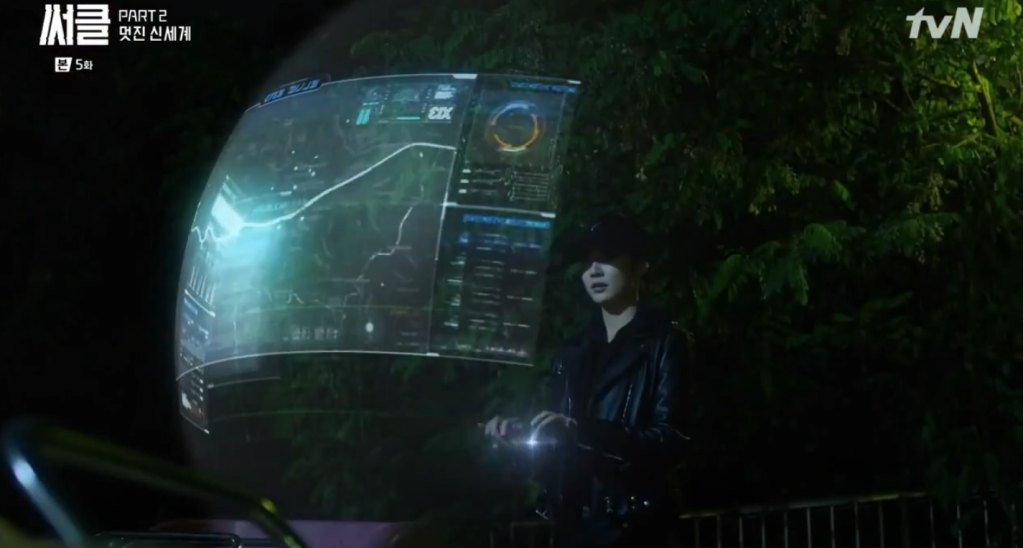
So, while I watching back in 2017 with my head full of theories and (I admit) equal quantities of gin, it was clear (to me at least): it was a time loop, a paradox. A continuity circle. And since I watching a show called Circle, the whole thing seemed laid out.
A future clone of Han Jung-yeon with the memory technology went back in time and became Byul. And that completed the circle – a time loop whereby Byul’s travel into the past handed us the memory technology we then used to create Smart Earth, which was then used to create her.
At some point, the “real” Han Jung-yeon would be born. But in keeping with the show’s non-linear narrative, this could be dozens – even hundreds – of years in the future. With her mind wiped before she jumped, she’d appear as a child who needed to learn how to function in the world. Why these future humans did this remained to be seen. But if the Earth was already on the verge of an environmental collapse in 2037 then these future humans could have been doing tests with time travel so they could either fix the timeline or possibly colonise the past. Maybe the human race of the future all exist as long-lived clones as a way to survive catastrophic climate change?
For whatever reason, I humbly admit I spent the last few hours of Circle convinced that Jung-yeon was a future clone who had travelled back in time.
I was wrong.
Or maybe the writers were.
And while it might be the height of hubris to state that writers are wrong about their own show, I hereby tender my argument in support of my position.
What do you think?
The Ending
One of Circle’s biggest challenges in its final episode is that most of its story was told. But only most.
Finding what happened to Woo-jin is the resolution of the show’s mystery. Bum-gyun accepting the Woo-jin clone as Woo-jin is the resolution of the emotional arc. Smart Earth’s collapse and the exposure of Human B’s crimes was the resolution of the thematic arc: having knowledge of the Chairman’s crimes was all that was needed to bring him down.
But as we approached the ending, there was one more thread the drama hadn’t tugged yet. The mystery of Byul herself. It was 30 years since she arrived in a flash of light but who is she? Where did she come from? Why is she here? These questions weren’t important to most of the plot of Circle but they are there. Thrumming away.
Maybe the writers had vague ideas of a second season. Maybe they just realised there was a big question going begging and they wanted to acknowledge its existence.
In Circle’s final scene, our twins and their anachronistic friend find out there there’s been another incident similar to her arrival. The news reports dark fog, a blackout, a huge beam of light. Just like when she appeared. It also reports a previously unknown incident in 1986. Whoever Byul’s people are – alien or otherwise – they’re here. They’ve been here for longer than we thought and more are coming.
Jung-yeon – who has spent Circle grappling with her own identity as Byul and Bluebird and has now settled comfortably on being Han Jung-yeon – finds herself unsettled by the news. As the camera pans in, something seems to activate inside her. Is it a memory of distant stars or a program that has started running in her technologically-enhanced mind?
We don’t know. And now we will never know.
With Circle nearly 6 years old, it is virtually impossible that we will get a second season. And so these questions will remain unanswered. The show’s final scene was not just open. It teased an entirely new story. While the clamouring for that story to be told has now died down, the enigmatic ending will sit there: an unanswered question forever.
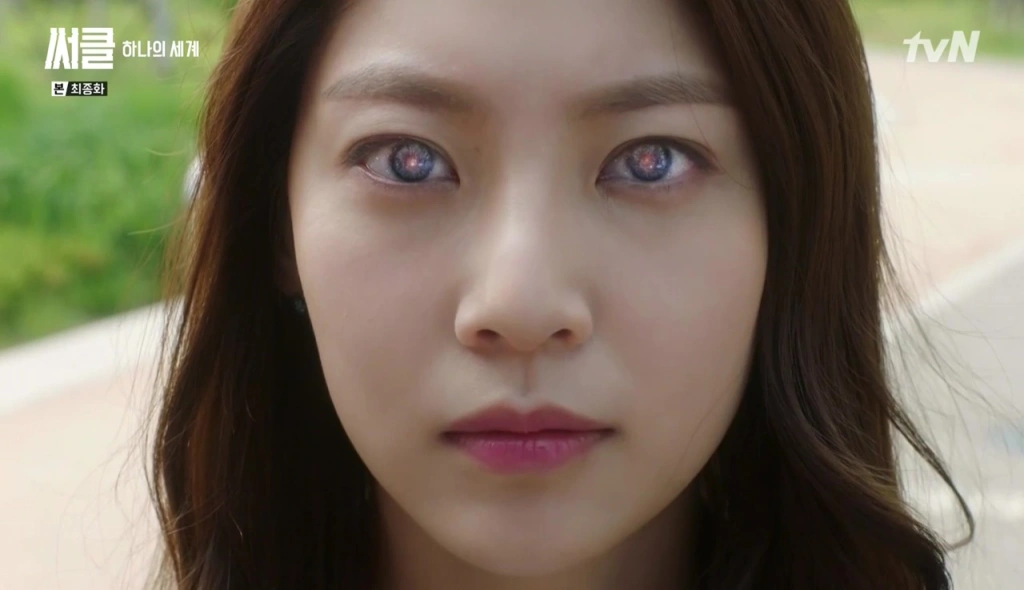
Final verdict
Circle still holds up, both as a story and as a drama. Yes, it’s cheap as chips and the budget shows but with an extra five years of drama watching under my belt, my rewatch has only confirmed that the show is still as enjoyable as I remember. It certainly can’t compare visually with the stunning cinematography of modern Korean dramas but it has a great story, keeps you engaged and has characters you can connect with.
It may not be as stylish as Silent Sea or as complex as Grid but it’s the first and last to combine both the human element of a Korean drama with an interesting science fiction story. Circle is about something and if you had a definition for speculative fiction of any kind that would be the main criterion. But Circle also makes us care deeply about the twins and about their friends. We want them to be reunited, we want Woo-jin to be alive, we want Bluebird to get her answers. The show has depth and heart and takes the time to make us feel what these characters are feeling as their assumptions about their lives and their pasts unravel before them.
Circle at times gets a bit too caught up with its own twists and turns (and did I mention it’s held together with duct tape and hope?) but it gets its emotions right. And in the final estimation, with its balance of story and characters, this is what makes Circle still one of the best science fiction dramas to come out of Korea. And a great gateway drama as well.
It’s a shame there’s nowhere to watch it in 2023.
EDIT: Since this post was published, I’ve become aware that Circle is available on BiliBili. I’m not aware of the legality of watching a drama on B Site or whether the Shanghai-based platform has paid for streaming rights. Nonetheless it seems to have all the episodes available with English subtitles.
Circle: Two Worlds Connected is not available for streaming on any platform in Australia


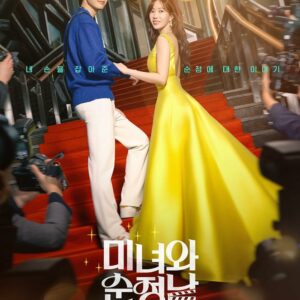
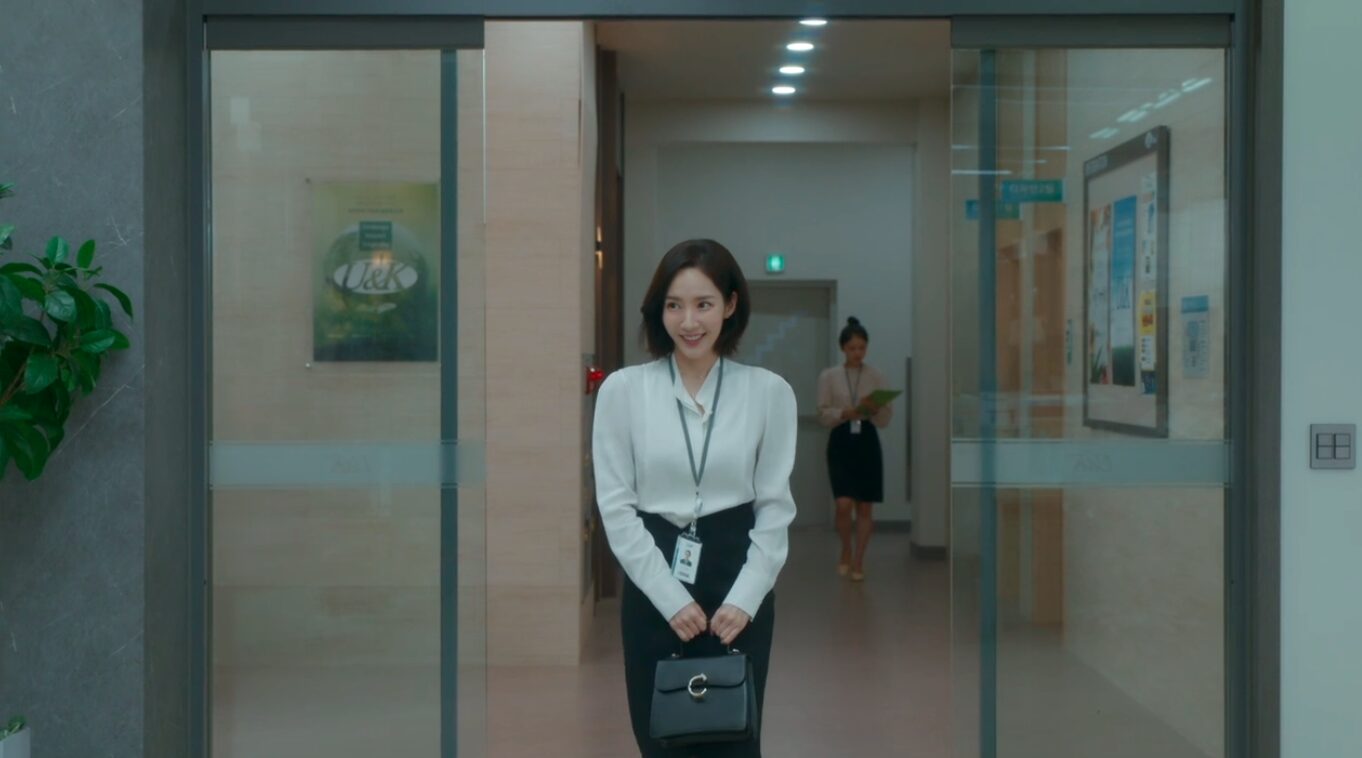
Sometimes it’s the productions held together with duct tape, hope, or even a toilet plunger that stick with us more than any of the slick high budget shows.
It’s so true. Sometimes I think also people get so caught up in how pretty their show is they forget the underlying story.
You’re a genius. I love your theory that this is, in fact, a time travel piece. You know I LOVE this show. I think a rewatch will be in my future as well. And yes, I have it all on a hard drive somewhere. Too bad no one else can watch it.
Oh yes, do! Go back in and see whether you think it still stands the test of time.
Writing this has made me interested in that potential second season, although I’m still not quite sure what the would look like.
Circle was truly mind-blowing – all your plugs for it pushed me to watch it and I loved every minute, but will also be forever wistful for what might have been with enough time and budget to answer all the questions it left spinning in the ether. And great news for Circle fans, at least in the US: it’s available free (but with ads) on the Roku Channel web site. I don’t know if that site works elsewhere, though. Credit to a tip from Babylilo at DB.
Oh good, I’m glad it’s available somewhere. And I’m so glad you got to watch it and enjoyed it so much.